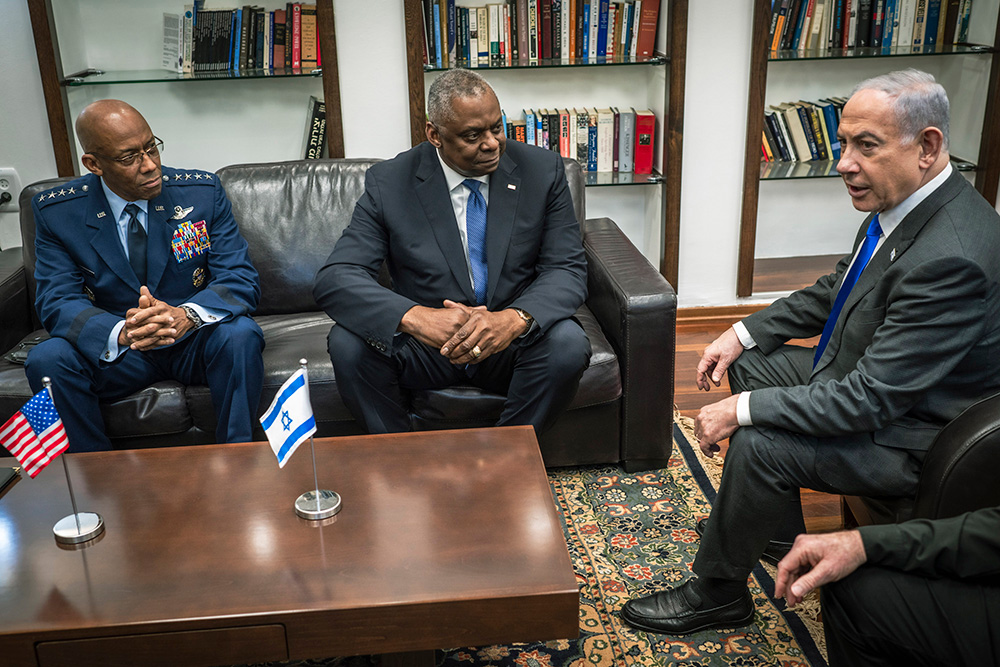Chairman of the Joint Chiefs of Staff Air Force Gen. CQ Brown, Jr., last weekend embarked on a three-country visit throughout the Middle East aimed at demonstrating the long-term U.S. commitment to the region as well as furthering his understanding of various perspectives concerning ongoing Middle East tension by engaging with U.S. partners and allies throughout the region.
Brown began his trip by engaging with key leaders in Jordan on Saturday, and he intends to hold discussions with counterparts and other officials in Egypt and Israel in the coming days.
“Over the next few days … Gen. Brown will continue to stress the importance of deterring further escalation of hostilities, protecting U.S. forces in the region, U.S. support of Israel’s self-defense, and a coordinated effort in providing humanitarian assistance to the civilians,” reads a statement from the chairman’s office.
“As ceasefire negotiations continue,” the statement goes on, “the chairman’s visit is reflective of the importance of reaching an agreement that returns the hostages, ends the violence and allows the entire region to focus on the next steps toward a more secure, stable Middle East.”
Speaking to members of the media while in route to Jordan last week, Brown said that part of his mission engaging with his counterparts in the coming days will be to determine whether a ceasefire will “bring down the temperature” in the region.
“It’s going to take a collective effort from across the region to bring down the temperature [and to] to increase security,” Brown said.
“And at the same time,” he continued, “as I talk to my counterparts, [I ask about] the types of things we can do to deter any type of broader escalation, and to ensure we’re taking all the appropriate steps to ensure we’re not going into a broader conflict.”
As an example of this, Brown noted that the U.S. has recently added additional military capability to the region “to send a strong message to deter broader conflict.”
Such capability in the region includes the USS Abraham Lincoln Carrier Strike Group, which recently arrived in the U.S. Central Command area of responsibility, the Pentagon announced Thursday.

Chairman of the Joint Chiefs of Staff Air Force Gen. CQ Brown, Jr., and Secretary of Defense Lloyd J. Austin III meet with Israeli Prime Minister Benjamin Netanyahu in Tel Aviv, Israel, Dec. 18, 2023. Austin and Brown traveled to Israel to meet with counterparts and underscore unwavering U.S. commitment to Israel’s right to defend itself in accordance with international humanitarian law. © Chad J. McNeeley, DOD
The Lincoln group joins the USS Theodore Roosevelt Carrier Strike Group in the region, bolstering additional assets in Centcom’s AOR that now include an Air Force F-22 Raptor squadron and the Ohio-class cruise missile submarine USS Georgia, which the Pentagon stated is also operating nearby.
“What’s paramount is the protection of our forces,” Brown said. “We have to make sure we posture to [not only] deter a broader conflict, but also to protect our forces.”
Regarding his overall role as chairman and the importance of staying engaged with regional partner and allies, Brown emphasized the importance of in-person interaction.
“I’ve got quite a bit of experience in the Middle East engaging with our partners,” Brown said. “And it helps to spend more than just a phone call, but to go face-to-face from across the table — I get to hear their perspective and they get to hear mine.”
“[One] can always pick a reason not to show up, but I think it’s important that I do.”
This is Brown’s second trip to the Middle East region since he became chairman of the joint chiefs in October of 2023. His first visit was to Israel with Secretary of Defense Lloyd J. Austin III in December of that year.





